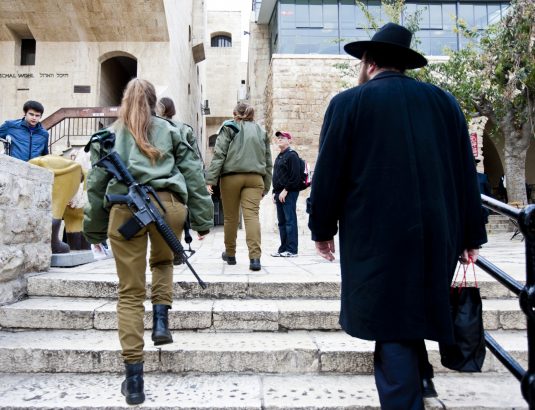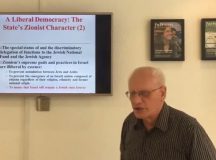In this careful mapping of the state of a country and a people at 70 the sociologist and Israel Prize Winner Sammy Smooha rejects all easy simplicities. His Israel is complex and contradictory, a global enigma.
The State
The creation of the State of Israel is a unique and exceptional achievement of the Jewish people. Demography and patterns of settlement tell the miraculous formation of the Jewish state: Jews were separated from the Land of Israel for 2000 years. In 1881 at the onset of the new Jewish immigration only 5 per cent of the population in Palestine was Jewish. Only 3 per cent of the Jewish people immigrated to Palestine before 1948. Jews settled on a land inhabited by another people, and at a time when Europeans no longer settled overseas. The Jewish settlers faced vehement resistance from the indigenous Palestinians who received the backing of the Arab world. At the same time, they could not count on the help of most Jews who followed non-Zionist movements (Agudat Israel, the Bund, Reform Judaism), enjoyed life in the West, or were isolated in Muslim regions, trapped in Communist countries, or had been killed by the Nazis.
Israel is Zionism’s success. The very existence of a Jewish state is not only a breakthrough in Jewish history but also a base of the new Jew who embraces the new Hebrew language and the new Jewish culture. Only Israeli Jews live in a state in which they exercise sovereignty, constitute a majority, live among Jews, interact with and marry Jews, study in Jewish schools, and assume responsibility for decisions they make as Jews. Moreover, they conduct their lives by the newly revived Israeli-Hebrew language, a linguistic revival that is unprecedented in history. They lead an Israeli way of life, characterised by rational thinking, education as a top value, hard work, materialism, consumerism, and high exposure to the mass media, but also by low regard for privacy, civility and law, and distinguished by familism (strong family ties and 2-3 children per family), and ethno-nationalism (Smooha, 2005; 413-442). Growing normalisation of Israeli-Jewish life is reflected in rise of individualism against normative collectivism, decline of voluntarism, consolidation of a political culture with restricted accountability, spread of political corruption and sexual harassment, and general weakening of commitment to values. This distinct, composite Israeli-ness is the great achievement of Zionism.
Yet, Zionism failed in other substantive respects. It promised to build a state in which Jews would not be just a sovereign majority but also an area where they enjoy a safe and normal life. Jews before and after statehood have been under terrorist attacks, feeling insecure and post-traumatic. Israel remains a state without permanent, peaceful and internationally recognised borders. The Jewish state and population are militaristic in the sense of relying on military solutions to the conflict with the Palestinians, continually settling the West Bank, failing to come up with any peace initiative since the Oslo Accords, and unwilling to take risks for peace (Kimmerling, 1993). Israeli governments under Benjamin Netanyahu have not launched any plan with hope for peace in the foreseeable future. Jewish militarism is unavoidable and functional in a belligerent country where Jews are frequently hurt and called to sacrifice their lives. Jews’ collective post-trauma dulls their sensitivity to the harm they cause to the enemy and to manifestations of its moderation (Ben-Eliezer, 2015).
The Conflict
The intractability of the conflict with the Palestinians has more, however, to do with its very nature than with Israel’s faults. Since the Palestinians experience the conflict as colonial, they reject Jewish claims to the land, expect the collapse of the Jewish settlement of Palestine like the fall of all colonial settlements, and find it difficult and unjust to make concessions to people they perceive as colonial settlers. The Jews see themselves as legitimate returnees to their ancient homeland, to which they claim, like the Palestinians, exclusive rights and deny counterclaims. The claims of both sides are internationally recognised and supported, leading to a conflict without victory and with a stalemate.
The conflict with the Palestinians diminishes Israeli democracy. Israel has been in a permanent state of emergency since 1948, giving the military and government sweeping powers of censorship, administrative detention, land expropriation, outlawing of organisations, and prevention of public discussion of critical issues, such as certain military operations and state nuclear policy (Hofnung, 1996). It also grants the military a superior say and sometimes even a veto power in security, foreign and other affairs (Peri, 2006). The mandatory draft constitutes a real barrier to civic equality between superior servers (combat officers), regular servers (non-combat and female soldiers) and non-servers (ultra-orthodox Jews and Arabs) in the military.
Religion
Israel defies theocracy, does not have a state religion, officially recognises Judaism along with Islam, the Druze faith and many Christian denominations, and observes freedom of religion. Yet, religion plays a central role in Israel’s public life (Yagdar, 2017). Like theocratic Iran and other Muslim states, Israel uses division into religious communities, known as the ‘Millet system,’ to regulate personal status. The state pigeonholes every resident into a single religion that decides how one marries and divorces, who is entitled to take custody of children, where to be buried, which foods are banned in state dining rooms, what religious material taught in state schools, and other invasions of private life. One is not allowed to escape this coercive classification except by conversion to another religion. Official Orthodoxy has the exclusive state power to determine who is a Jew, who is a Rabbi and which conversion to Judaism is valid. Public transportation does not run on Sabbath and Jewish holidays. Ultra-Orthodox Jews are granted extraordinary privileges: their men up to age 45 study in Yeshivas, neither serve in the army nor work, and receive generous allowances and other benefits from the state. This pervasive religious coercion is incompatible with democracy as conceived and practiced in the West where de facto separation between religion and state is the rule.
Democracy
Although Israel’s unique Jewish and Zionist character restricts its democracy, Israel declares itself as a Jewish and democratic state. It is indeed a resilient democracy, surviving the crises of the Yom Kippur and Lebanon wars and the banks collapse. It was created and is internationally acknowledged as a Jewish state. It is a nation-state of the Jewish people and the fulfilment of its right to self-determination. It legitimately maintains a Jewish majority, a Hebrew language, an Israeli-Hebrew culture, a Jewish calendar, Jewish symbols, and special relations with the Jewish Diaspora. Yet, Israel is at the same time Zionist for being the state of and for Jews only, in Israel and abroad, and not of its non-Jewish citizens. The state is designed and actually acting to preserve its Jewish majority forever by various means, among which are the Law of Return, the denial of right of return to the Palestinian refugees, a law not allowing residence in Israel of an Israeli (practically an Arab) with a spouse from the West Bank or another enemy area, not accepting Gentile immigrants and asylum seekers, and provision of ‘an absorption basket’ of benefits to Jewish immigrants.
Israel acts as a defensive democracy not only in matters of national security but also in protection of its national character. For example, it is not possible to challenge Israel’s national character through election to the Knesset because it is not allowed to form a political party that denies Israel as the homeland of the Jewish people. The implication is that the right to vote and be elected in Israel, like the right to get married and divorced, is restricted. Jews’ right to self-determination, history of persecution, the Holocaust, and the continued resistance of the Arab world to the Jewish state are some of the justifications given to this Jewish exclusivity.[i]
The Minority
The deep divide between Arab and Jewish citizens can better be understood against the backdrop of Israel’s dispute with the Palestinians and its Jewish-Zionist mission. The Arab minority (18 per cent of Israel’s citizen population) has a double deadly characteristic: it is part of an active enemy (the Palestinian people) and a dissident (non-Zionist) population. Arab citizens cannot be fully equal and identified with the Jewish state, and the state and the Jews cannot fully trust and treat them as equal. To illustrate, in a representative opinion survey I conducted in 2017, 69.5 per cent of the Jews agreed with the statement that ‘an Arab who defines oneself as “a Palestinian Arab in Israel” cannot be loyal to the state and its laws’. Another question found that 68.3 per cent believe that ‘in decisions about the state’s character and borders, a majority from among the Jews is required and a majority from among all citizens is not sufficient,’ and 67.8 per cent thought that ‘a law is required to determine that democracy would prevail in Israel only if it does not harm the Jewish state.’ Among those identifying as right-wingers, who constitute a majority among the Jews, these figures rise to over 80 per cent, showing little political tolerance (Smooha, 2017).
The broader picture is, however, not so gloomy as these findings might suggest. Despite being ‘an ethnic democracy’ (a democracy that combines civil rights for all with institutionalised ascendency of an ethnic majority; neither a liberal nor consociational political system), Israel grants Arabs cultural collective rights in addition to individual rights (Smooha, 2002: 475-503). It recognises Arabic as an official language and provides the Arabs with separate, fully funded state schools in Arabic. Their identity and culture are respected and no pressure is exercised on them to assimilate. They are exempted from compulsory military and civil service, but are welcome as volunteers. Since 2016 the right-wing government has been investing heavily in the development of the Arab sector along with making anti-Arab pronouncements and legislations. It intends to enact a nation-state law that subordinates democracy to the Jewish character of the state, consolidates Israel as a uni-national state, and continues to deny Arabs national collective rights (not recognising them as Palestinians with legitimate Palestinian identity and ties with the Palestinian people). Despite all these deprivations, the Arabs remain law-abiding and conduct their struggle for equality and peace within the democratic system. They have become stakeholders in Israeli society due to their inclusion in Israel’s religious and cultural pluralism, democracy, modernity, and the welfare state system. Of course the Arab-Jewish power-imbalance and the Arabs’ exemption from a duty of state service are the other essential cornerstones of the stability and quiet in the relations of the Arabs with the Jews and the state (Smooha, 2017; Smooha, 2015).
The Tribes
Mizrahim (Jews from Muslim countries) were another group that was hard hit by the Labour establishment during the years 1948-65. Their mass immigration was regarded as a blessing for a fledgling state in dire need of population increase, a precondition for strengthening national security and rapid economic development. But at the same time it was viewed as a burden because of its perceived low-quality as human capital and its perceived threat to democracy and to the new secular and European Israeli culture. The new Mizrahi arrivals were pushed down into the lower rungs of society. They pushed up Ashkenazi (European) Jews, both veterans and newcomers. Their culture was shattered in the name of the Zionist melting-pot ideology that was practiced as blatant ethnic subordination. They responded with rejection of Labour and support of the political Right who climbed on their shoulders to national government in 1977 (Smooha, 2004). Today many Ashkenazim, especially the elites, experience the ascendance of the political Right as a delayed realisation of the Mizrahi threats of the 1950s.
It is possible to see the emerging ethnic-social structure of contemporary Israeli society as early as the late 1950s. At the top are Ashkenazi Jews who founded Zionism, the Yishuv (the new Jewish community before 1948), the state and Israeli society and culture. They staff the middle and higher classes along with the economic, cultural, academic, judicial and media elite. They support the political left-centre bloc that embraces Israel as a more democratic than Jewish state and stands for universal values and two states for two peoples. At the bottom are Palestinian Arab citizens, populating the working and lower classes, not sharing power, and standing behind non-Zionist, national Arab parties and for a two state solution. In the middle are Mizrahim, Russian speakers who arrived after 1989, Ethiopians, ultra-Orthodox and Orthodox Jews, and descendants of Revisionists (right-wing Zionists who dissented from Labour Zionism). Most of them are in the lower and middle classes, making the social base of the political right. They stand for Israel as a more Jewish than democratic state and for not so liberal values and against or reserved about partition of the Land of Israel (Shafir and Peled, 2002).
A social democracy no longer
Israel is far from qualifying as a social democracy, in spite of its past ethos of social justice and equality and its formation by the political Left. A quarter of the population is officially poor. Inequalities in family income and scholastic achievements of schoolchildren are the highest in the West. Privatisation, non-organised labour, cartels, appreciable disparities between employees in high versus low tech branches of the economy, deep cuts in social services, commercialisation of the academia, political corruption, and other ills of the free market are staggering. Israel is a start-up nation that leaves many of its people behind. Neo-liberalism is the ideology that drives and legitimates these policies and developments (Zeira, 2017).
World Jewry
Zionism has a mixed record vis-a-vis world Jewry. Since its proclamation Israel has become a safe haven for Jews, absorbing 3.2 million Jews. It is now home for over 40 per cent of all Jews, and of the largest and fastest growing Jewish community in the world. By self-segregation and endogamy, Israel ensures the survival of the Jewish people. On the other hand, it also creates for Diaspora Jews an irritating dilemma of potential dual loyalty and anti-Jewish suspicions and accusations. Moreover, Diaspora Jews support the national character of Israel as an ethno-religious (Jewish) state but at the same time oppose the ethnicisation and religionisation of their countries of residence, doubly acting for their own interest (Pew, 2016; Liebman, 2003). Israel did not put an end to antisemitism. On the contrary, the new antisemitism targets Israel and Jews in general as oppressors of the Palestinians in an ‘Apartheid’-like state. Hate crimes against Jews are on the rise in Europe (Enstad, 2017).
Israel and Israelis are not angels. They are flesh and blood, good and bad, with successes and failures. The great success is the creation of a new Jew and a new Jewish state, Jews’ return to history as actors and restoration of their control over their destiny. In the world today there are in the main two kinds of Jews: An Israeli Jew and a Western Jew. Both are new historical entities. They differ markedly in ethnic composition (Mizrahim and Sephardim constitute over 40 per cent in Israel but less than 10 per cent in the Diaspora), way of life, identity, culture, relations with non-Jews, rate of exogamy, status in society, and the nature of states they live in, but they share peoplehood and mutual responsibility.
An Exceptional Case?
The common view of Israel as a proud member of the Western family of nations is hard to accept (Yakobson and Rubinstein, 2008). As discussed above, Israel is neither Western nor liberal, although it has certain elements of both. Some ways in which it seems to be unique are the following: Israel is a country without peaceful borders; it is in constant warfare; it does not have a constitution; the state and society were created by a Diaspora; they were formed by the political Left but since 1977 have been subject to an historical process of reconstruction by the political Right; Israel has a minority which is part of an active enemy; it declares itself and functions as a state of a people whose lion’s share still lives outside the country; and for more than 50 years it has subjected the stateless Palestinian people to occupation or siege.
As a deeply divided society Israel is largely exceptional. Violence and political instability are common in deeply divided societies like Turkey, Sri Lanka, Sudan and former Yugoslavia. In contrast, there is almost no violence between religious and secular Jews and between Arabs and Jews within the pre-1967 borders. The October 2000 Arab unrest, in which the police shot to death 13 Arab protesters, is limited in scale compared to other deeply divided societies. On the other hand, the ethnic nature of democracy in Israel is more severe than in other ethnic democracies. For instance, Estonia, like Israel, is an ethnic democracy that declares itself as the homeland of the Estonian people, but ethnic membership in Estonia is determined by language and culture that are amenable to assimilation, whereas in Israel membership is defined by inflexible ethnic descent and religion. The deep divide in Estonia between the Estonian majority and Russian-speaking minority is moderated by the integration, partnership and peace prevalent in the European Union, whereas in Israel the deep divide between the Jewish majority and Arab minority is reinforced by the regional Israeli-Arab conflict.
An Enigma
All in all, Israel is not like other countries. It is a hybrid, a mixed bag, hard to classify. While it shares the inhospitable characteristics of many states, it has not given up the Zionist vision of becoming a light to all the nations, a model state, and a source of inspiration. This dream adds to its distinctiveness and its character as a global enigma.
[i] For a review of what is acceptable and unacceptable justification, see Chaim Gans, A Political Theory for the Jewish People, (Oxford: Oxford University Press, 2016).
Bibliography
Alexander Yakobson and Amnon Rubinstein, Israel and the Family of Nations: The Jewish Nation State and Human Rights, (New York and London: Routledge, 2008).
Baruch Kimmerling, ‘Patterns of Militarism in Israel,’ European Journal of Sociology 2 (1993): p. 1-28.
Charles S. Liebman, ‘Jewish Identity in the United States and Israel’, in New Jewish Identities: Contemporary Europe and Beyond, edited by Zvi Gitelman, Barry Kosmin and András Kovács, (Budapest and New York: Central European University Press, 2003), p. 291-316.
Gershon Shafir and Yoav Peled, Being Israeli: The Dynamics of Multiple Citizenship, (Cambridge: Cambridge University Press, 2002).
Johannes Due Enstad, Antisemitic Violence in Europe, 2005-2015: Exposure and Perpetrators in France, UK, Germany, Sweden, Norway, Denmark and Russia, University of Oslo, June 2017.
Joseph Zeira, Israeli Economy, (Tel Aviv: Yediot Sfarim, 2017), in Hebrew.
Menachem Hofnung, Democracy, Law, and National Security in Israel, (Aldershot: Dartmouth, 1996).
PEW, A Portrait of Jewish Americans: Findings from a Pew Research Center Survey of US Jews, 2013; PEW, Israel’s Religiously Divided Society, 2016, p. 46-65.
Sammy Smooha, ‘Is Israel Western?’ In Comparing Modernities: Pluralism versus Homogeneity: Essays in Homage to Shmuel N. Eisenstadt, edited by Eliezer Ben-Rafael and Yitzhak Sternberg, (Leiden and Boston: Brill Academic Publishers, 2005), p. 413-442.
Sammy Smooha, Still Playing by the Rules: Index of Arab-Jewish Relations in Israel 2017. Research Report. Forthcoming.
Sammy Smooha, “The Model of Ethnic Democracy: Israel as a Jewish and Democratic State”. Nations and Nationalism 8, 4 (October 2002): p. 475-503.
Sammy Smooha, Still Playing by the Rules: Index of Arab-Jewish Relations in Israel 2015, Haifa: Pardes Publishing House, 2017 (in Hebrew); Sammy Smooha, Still Play by the Rules: Index of Arab-Jewish Relations in Israel 2015, https://www.academia.edu/31576103/Still_Play_by_the_Rules_Index_of_ArabJewish_Relations_in_Israel_2015.
Sammy Smooha, “Jewish Ethnicity in Israel: Symbolic or Real?” In Jews in Israel: Contemporary Social and Cultural Patterns, edited by Uzi Rebhun and Chaim I. Waxman, (Hanover, NH: Brandies University Press, published by University Press of New England, 2004), p. 47-80.
Uri Ben-Eliezer, The Making of Israeli Militarism, Bloomington and Indianapolis: Indiana University Press, 1998; Irit Keynan, Psychological War Trauma and Society: Like a Hidden Wound, (New York: Routledge, 2015).
Yaacov Yadgar, Sovereign Jews: Israel, Zionism, and Judaism, Albany, NY: SUNY Press, 2017).
Yoram Peri, Generals in The Cabinet Room: How the Military Shapes Israeli Policy, (Washington, DC: United States Institute of Peace Press, 2006).





































